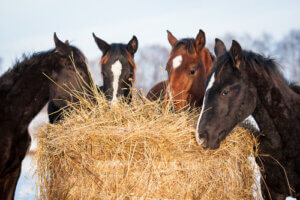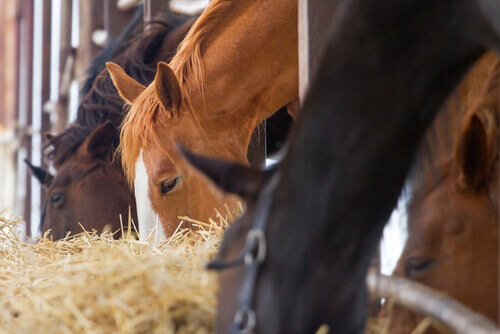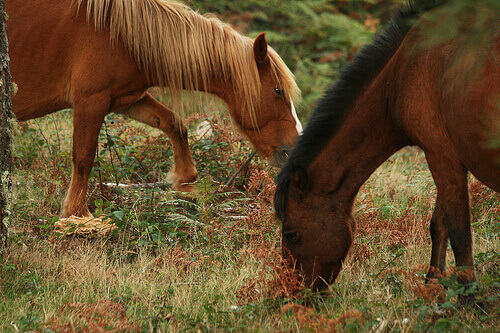The Essential Nutrients Every Horse Needs


Written and verified by the lawyer Francisco María García
Horses are beautiful animals that have always stood out for their strength and nobility. If you’ve decided to get one, you should know how to feed it properly. What are the nutrients your horse needs? This question is the starting point to learn how to properly care for these animals and satisfy their basic needs, both physical and mental.
It’s important to know your horse well in order to determine the feeding plan you’ll follow. Its age, weight, stage of growth, and the activities it performs are all factors that will decide its nutritional needs. Otherwise, you may run the risk of overfeeding or not offering the necessary nutrients.
Feeding’s a very important factor in the care that your horse requires. However, there are other important aspects to their care. We’re talking here about comfortable housing, a place to exercise, maintaining proper hygiene of the environment and skin, including daily brushing, and, of course, companionship.
Basic food for your horse
Forage is fundamental in a horse’s diet. It’s important to analyze if the animal is physically able to process high volumes of vegetable fiber. And, also, if its digestive system has the necessary enzymes to get the energy it requires from the food in order to develop, maintain, and reproduce.
Equines have a distinctive digestive apparatus among mammalian-herbivores. That is, their stomach’s very small and their intestine is quite long. For this reason, they’re prone to digestive problems, colic, and intestinal obstructions.
Horses need at least 60% fiber in their daily diet, in addition to the nutrients necessary to maintain a stable intestinal flora.

Main nutrients that your horse needs
Horses basically feed on hay, grass, straw, and forage. To these feeds, we can add cereals, meadow hay, alfalfa, and beet pulp.
It’s important to design a balanced diet that includes the nutrients that provide the horse with an optimal life cycle. This is crucial in minimizing the risk of digestive problems.
In order for the animal to carry out all its daily activities well, it’s important that any feeding program includes the following nutrients: Water, proteins, vitamins, and minerals.
There’s no definitive formula for how much of each of these nutrients should be included in the diet. This will depend largely on the particular characteristics of the horse and its dietary needs.
Water, minerals, and vitamins
Among the vitamins that your horse needs, we have those that are water-soluble and those that are fat-soluble.
The main ones are vitamin A, D, E, K, and B complex. Some of these vitamins are obtained by adding them to their daily forage, others are metabolized by the horse’s own organism when grazing or through exposure to the sun and open air.

Calcium is indispensable in the formation and strengthening of bones, and phosphorus helps in the activation of B vitamins to metabolize carbohydrates. In addition, other minerals are also healthy. These include sodium, copper, potassium, chlorine, iodine, zinc, magnesium, manganese, chloride, and silicon.
Proteins
Regarding protein, there are essential amino acids such as lysine, which is essential in the growth stage. This substance should be included in the diet in the form of soybean or flaxseed meal and legumes (alfalfa, clover, etc.).
Other important amino acids are alanine, arginine, aspartic acid, glutamic acid, carnitine, cysteine, creatine, glycine, histidine, methionine, phenylalanine, or isoleucine.
Hydration and carbohydrates
You must ensure that your horse has access to clean water at all times; remember that it must drink a minimum of 8 gallons of water daily. This amount will vary according to weather conditions. Grass, for example, can have high levels of liquids.
Carbohydrates and fats that provide energy should also be included in the equine’s diet. Insufficient energy intake can cause health problems.
All these nutrients are essential for the development and strengthening of your horse’s bones, muscles, tissues, hormones, and enzymes, which will help it to regulate its body’s basic functions. This way, you’ll enjoy a strong and healthy horse.
Horses are beautiful animals that have always stood out for their strength and nobility. If you’ve decided to get one, you should know how to feed it properly. What are the nutrients your horse needs? This question is the starting point to learn how to properly care for these animals and satisfy their basic needs, both physical and mental.
It’s important to know your horse well in order to determine the feeding plan you’ll follow. Its age, weight, stage of growth, and the activities it performs are all factors that will decide its nutritional needs. Otherwise, you may run the risk of overfeeding or not offering the necessary nutrients.
Feeding’s a very important factor in the care that your horse requires. However, there are other important aspects to their care. We’re talking here about comfortable housing, a place to exercise, maintaining proper hygiene of the environment and skin, including daily brushing, and, of course, companionship.
Basic food for your horse
Forage is fundamental in a horse’s diet. It’s important to analyze if the animal is physically able to process high volumes of vegetable fiber. And, also, if its digestive system has the necessary enzymes to get the energy it requires from the food in order to develop, maintain, and reproduce.
Equines have a distinctive digestive apparatus among mammalian-herbivores. That is, their stomach’s very small and their intestine is quite long. For this reason, they’re prone to digestive problems, colic, and intestinal obstructions.
Horses need at least 60% fiber in their daily diet, in addition to the nutrients necessary to maintain a stable intestinal flora.

Main nutrients that your horse needs
Horses basically feed on hay, grass, straw, and forage. To these feeds, we can add cereals, meadow hay, alfalfa, and beet pulp.
It’s important to design a balanced diet that includes the nutrients that provide the horse with an optimal life cycle. This is crucial in minimizing the risk of digestive problems.
In order for the animal to carry out all its daily activities well, it’s important that any feeding program includes the following nutrients: Water, proteins, vitamins, and minerals.
There’s no definitive formula for how much of each of these nutrients should be included in the diet. This will depend largely on the particular characteristics of the horse and its dietary needs.
Water, minerals, and vitamins
Among the vitamins that your horse needs, we have those that are water-soluble and those that are fat-soluble.
The main ones are vitamin A, D, E, K, and B complex. Some of these vitamins are obtained by adding them to their daily forage, others are metabolized by the horse’s own organism when grazing or through exposure to the sun and open air.

Calcium is indispensable in the formation and strengthening of bones, and phosphorus helps in the activation of B vitamins to metabolize carbohydrates. In addition, other minerals are also healthy. These include sodium, copper, potassium, chlorine, iodine, zinc, magnesium, manganese, chloride, and silicon.
Proteins
Regarding protein, there are essential amino acids such as lysine, which is essential in the growth stage. This substance should be included in the diet in the form of soybean or flaxseed meal and legumes (alfalfa, clover, etc.).
Other important amino acids are alanine, arginine, aspartic acid, glutamic acid, carnitine, cysteine, creatine, glycine, histidine, methionine, phenylalanine, or isoleucine.
Hydration and carbohydrates
You must ensure that your horse has access to clean water at all times; remember that it must drink a minimum of 8 gallons of water daily. This amount will vary according to weather conditions. Grass, for example, can have high levels of liquids.
Carbohydrates and fats that provide energy should also be included in the equine’s diet. Insufficient energy intake can cause health problems.
All these nutrients are essential for the development and strengthening of your horse’s bones, muscles, tissues, hormones, and enzymes, which will help it to regulate its body’s basic functions. This way, you’ll enjoy a strong and healthy horse.
This text is provided for informational purposes only and does not replace consultation with a professional. If in doubt, consult your specialist.








